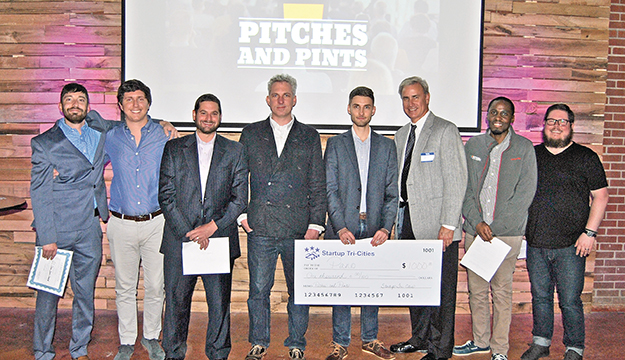Photo above: The participants in the Pitches and Pints event hosted by Start-Up Tri-Cities May 4: Luke Champouillon, Paul Champion, Michael Rice, Ben Collins, grand prize winner John Cowan, Kingsport Mayor John Clark, who presented the check to Cowan, Charles Kunene and James Eaton. Photo by Scott Robertson
By Scott Robertson
Aspiring entrepreneurs presented ideas, gathered feedback, and in some cases, took home some much-appreciated assistance in the form of prizes from the Pitches and Pints pitch competition May 4 at the Model City Events Center in Kingsport. The competition, akin to TV’s Shark Tank or the erstwhile Will This Float? competitions, drew seven entrepreneurs in addition to their hosts from Startup Tri-Cities, all entrepreneurs themselves.
Startup Tri-Cities is a network of entrepreneurs and organizations dedicated to supporting new startups in the Tri-Cities, TN/Va region. It was founded by Edwin Williams of Perserbid, Arnab Chakraborty of Flow Med-Tech, and David Nelson of and Travis Rother of Brewfund, Inc.
Pano, a basement start-up presented by John Cowan took home the first-place prize of $1,000 in cash and $1,500 of consulting. Incredimed’s HealthBase program, presented by Michael Rice, took second place, earning $500 in business attorney services. Luke Champouillon’s Action Sports Complex pitch earned a Co.starters entry and Charles Kunene’s Obaa won a free pass from Spark Plaza for taking fourth place.
The event, attended by around 100 people, served as a reminder of the characteristics necessary for entrepreneurial success. Afterward the judges commented on the drive, creativity, resilience and courage shown by the entrants. This month The Business Journal will introduce you to some of those entrepreneurs, as well as others who did not compete in Pitches and Pints.

Perserbid founder Edwin Williams in Kingsport. Photo by Sweet Snaps Photography
Perserbid links homeowners, contractors
Edwin Williams’ idea for his startup company, Perserbid, grew out of a tool he had created for another venture. “I caught the entrepreneur bug at the University of Missouri-St. Louis,” Williams says. “Getfit Gadgets was the company I started in St. Louis. It was like a custom fitness equipment company. In St. Louis, we had our first prototype we were trying to get built. We were looking for a shop to take it to the next step. I came up with the idea of being able to post the prototype online and having manufacturing shops who do prototyping bid on the job. I could send them my prototype (specs), they could build it, I’d pay for it and they’d send it to me.”
One Christmas when Williams was back in Johnson City visiting family, an alternate use for his bid system appeared. “My mom was complaining about a contractor who had messed up her bathroom and I was like, ‘Oh, well, I’ve been working on this idea for manufacturing; I wonder if it would work for residential contracting.’” Williams went back to St. Louis, rewrote his entire business plan as Getfit Gadgets was ending its run, and moved back to the Tri-Cities.
In Perserbid’s business model, the company acts as a go-between for homeowners and contractors, taking a 6 percent cut from every job on the homeowner side and 3 percent on the contractor side. “Let’s say you want your kitchen remodeled,” Williams explains. “You create a job ticket with the description of what you want. Then contractors will see it and will contact you. You can talk with them through our chat system before you pick which ones you want to come out to give quotes. Then they do the quotes on the site so you can compare them. When you pick a contractor, that contractor then sets up an escrow schedule so they can break down the payments as draws. You’ll get a notification when the contractor needs you to release the funds. That process continues until each milestone is hit.” Once the job is complete, the homeowner signs off on it.
Williams’ Perserbid journey has taken him from St. Louis, through ETSU, the local home builders association, and KOSBE. Now, however, Williams feels Perserbid is far enough along he can devote time to helping other entrepreneurs. “Time is precious,” Williams says. “Entrepreneurs need to spend it growing their companies. We just want to make life easier for the next guy than it was for us.”
Obaa offering scientists secure, worldwide collaboration tool

Obaa founder Charles Kunene in Kingsport. Photo by Sweet Snaps Photography
When Arnab Chakraborty, one of the founders of Startup Tri-Cities began recruiting Charles Kunene to bring his business to Kingsport, Kunene’s first response was, “there’s nothing there.” Kunene had been working in a business accelerator at MIT. But Chakraborty proved Kunene wrong, introducing the Swaziland-born entrepreneur to mentors and medical researchers in the region who could help Kunene get his product, Obaa, off the ground by making it easier for him to prove his concept.
Put simply, Obaa is a software product that combines cloud-based messaging and file sharing to allow researchers to collaborate better in teams, even across national borders. “Researchers often cannot share and communicate with teammates on the same platform,” Kunene says. “So we’re combining their communications and their files into the same app so they won’t need to log in to a different app to back up or store their files or to share them, and they don’t need to use yet another app such as email or whatsapp to communicate with colleagues wherever they are. They can do all of that with obaa.
“One of the big issues researchers have now is that if they are working at a big institution, typically their files are stored in a local server. That means if you’re working with another researcher in South America or China and you’re sharing proprietary data, it’s hard to share those files and keep an accurate audit of who in your lab has access to them. We’re taking that into the cloud so it won’t matter where they are or what device they’re using.”
One example Kunene sites is Southern Methodist University in Dallas, an institution with which he is currently in talks. “We talked to them initially for customer development and that’s where we really came up with our principal use case with a researcher who had colleagues in China and colleagues in South America. At SMU they also make researchers buy a drive that is secure, but they don’t subsidize the cost. So if you work at SMU, you have to pay for this encrypted drive to store your data, which you then can’t share with someone somewhere else. It only allows researchers to take their work home. So that lab creates an (Obaa) account for the lab and has their researchers within that bucket. That allows them to share documents with each other, and they can invite people in onto the platform from other countries who can then view that data.”
 Of course the idea of sharing research data across national borders, or anywhere online, raises security concerns, which Kunene says Obaa addresses. “Our platform is hosted on Google Cloud which itself is certified with multiple PCI certifications. But we’ve also done some legwork on our platform to make sure data is secure at rest and in transit. So not only are we backed up by Google’s platform, but we have security in our own product to make sure data is safe.”
Of course the idea of sharing research data across national borders, or anywhere online, raises security concerns, which Kunene says Obaa addresses. “Our platform is hosted on Google Cloud which itself is certified with multiple PCI certifications. But we’ve also done some legwork on our platform to make sure data is secure at rest and in transit. So not only are we backed up by Google’s platform, but we have security in our own product to make sure data is safe.”
Other ventures including Slack, Accutest, Lablynx and LabWare are ahead of Obaa in entering the market, but none have the same model, Kunene says.
“Going forward one of the big issues is what kind of feature set we want. Every file sharing platform has the same basic package – send messages and so forth. You have the basic text messaging and audio and video calling, and that’s on our timeline right now. But I really think the opportunities in artificial intelligence to enable people to work faster on the same platform instead of having to do everything manually will be the big differentiator for us. We see some opportunities as well for augmented reality, especially in the healthcare space.”
Pano takes a panoramic view

Madison Hilliard and John Cowan in Pano’s basement office in Bristol. Photo by Scott Robertson
John Cowan had had enough. Working 19 hour days for a large corporation in Rockville, Md., left him little free time, and what free time he had was largely wasted because he’d had no time to build up a network of friends. He didn’t know what to do or where to go. “I felt a real strong disconnection from the community, and I knew I wanted to develop something to expedite that (community inclusion) process,” Cowan says from the Bristol basement from which he and a few colleagues are developing that something.
“I left the company, saved up some money and started Pano in an effort to connect young professionals in the area,” Cowan says. “The idea at the time was to get access to a user base through gyms. In fact, I’m embarrassed to say the original name for the product was gymlink. That didn’t work at all. There just weren’t enough people at gyms. Our customer acquisition cost was just way too high. The demographics were splintered.”
But when you look at college, the numbers are there, as is a similar sense of disassociation - at least among freshmen, and the demographics are consistent.
“So I had another aha moment that we could hit the colleges first, then expand into the young professionals niche,” Cowan says.
“The idea instantly resonated with universities, who became our partners instead of our customers because they’re facing issues of attrition,” Cowan says. “Even students who are succeeding academically, if they feel socially isolated, it just kills their spirit and they are more likely to drop out.”
So with a base of colleges and universities eager to engage students as part of a greater community providing a population of eyeballs for advertisers, the question became, ‘how do we create the value for businesses that will generate revenue for our business?’
Madison Hilliard handles marketing, strategic branding and design for Pano. She had been working with yik yak, another social media app when Cowan approached her. “It was something I wanted to get on board with because it was something I believed in,” she said.
The business model Hilliard and Cowan have settled on crowd-sources the process. Students post “memories” from their experiences at businesses. Those businesses are then charged for the mentions in the community, though at much lower rates than on sites like facebook. The businesses’ subscriptions to Pano are the chief revenue driver for the company.
Cowan and Hilliard credit another colleague, Daniel Baker, for handling the tech side. Says Hilliard, “The three of us have formed this dream team of collaboration.”

Benjamin Walls in his Bristol gallery.
Walls pictures a thriving travel business
Photographer Benjamin Walls, who owns his own gallery on State Street in Bristol, has spent the last decade travelling the world to capture breathtaking images of landscapes and wildlife most of us will only see remotely. In the last year, however, he has taken to the notion of helping more people see those sights firsthand.
Walls, who says he has traveled more than a million miles in the last decade, including stops on every continent save Antartica, recently founded Wallsabout, an agency offering high-end tours of areas Walls has visited in his travels.
Walls first considered the enterprise when it was suggested by a client who, upon seeing photographs Walls had taken in Africa gushed, “I wish you could take us!”
What those clients didn’t know was that before he became a professional photographer, Walls studied business and tourism at Appalachian State University in Boone, N.C. “In fact, my senior project in tourism was, in shorthand, what we’re doing with Wallsabout today. So had I tried my hand at being a photographer and failed, I probably would have gone straight into something like Wallsabout.”
The fact that he has had enough success to finance a decade of excursions, however, has put Walls in the position to offer tours from a perspective of experience. Not many tourism agents have spent the amount of time out of country Walls has, nor the contacts. “I can’t say enough about how important it is to have a really good asset in country,” he says, “a guide, somebody who knows the lay of the land and can take care of details.

Members of Wallsabout’s first tour group on safari.
Walls began researching whether it would make business sense to begin the new venture a couple of years ago. “I’m an artist, but I’m also a businessperson. I study the numbers and pay attention to the details every other businessperson does – feasibility, human resources – this is business.
“We have four trips planned right now, but we didn’t start out that way. We did a lot of research. We needed to know what our clients’ expectations would be and whether we would be able to meet that. We did our first trip, a luxury safari to Africa ad it went really well, so that gave me the proof and the confidence to say, ‘Okay, this is a feasible thing. Let’s see if we can book another Africa trip. Then we looked at other places I’d been. That’s what put Australia and New Zealand in play because I know those places so well. Then based on client feedback we found there was demand for Cuba.”
That those clients have already seen beautiful images of these places doesn’t hurt in selling the tours, of course. “My clients have followed what I have done, whether it was going to Africa or India, these exotic places. They figure, ‘Here’s a guy that’s managed that and has been there and back. He knows the lay of the land. He knows the guides’. So I think it was pretty natural for them to make that request of me.”




